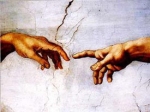Verse: 1 Corinthians 5:6 Your boasting is not good. Do you not know that a little leaven leavens the
whole lump? ESV
1 Corinthians 5:1-13; Galatians 5; Revelation 3
Leaven is a corrupting (or at least changing) agent that affects everything it touches.
Leaven starts with a small piece but ends up changing the nature of the whole. It is often used as a symbol for sin, but it was
also used by Jesus as a picture of how the kingdom of God comes into our lives.
A little leaven leavens the whole lump. This is often used in connection with the Scripture that tells us
that one small transgression of the law makes us guilty of the whole law. In the selection from 1
Corinthians 5, there were some people involved in sexual immorality in the church and they boasted in
their practice. In James, the same principle is stated.
James 2:1; 8-11
For whosoever keeps the Law [as a] whole but stumbles and offends in one [single instance]
has become guilty of [breaking] all of it. For He Who said, You shall not commit adultery, also
said, You shall not kill. If you do not commit adultery but do kill, you have become guilty of
transgressing the [whole] Law. [Exodus 20:13,14; Deuteronomy 5:17,18.] AMP
It may seem on the surface, that perfection or failure is the only option but this is not really the message
of Scripture or the purpose of the law (Torah).
The word “Torah” can best be interpreted to mean “instructions” rather than Torah as a list of rules to
be done. Jesus said that all of the law (books of the Torah) and the prophets (books of the prophets)
were completed in only two things:
1. Love God with all your heart, and
2. Love your neighbor as yourself.
This sounds simple enough, so why all the fuss about sacrifices, punishments, regulations, food laws,
works, restrictions, marriage laws, and so on? The law of Moses (Torah) describes what it looks like to
live in covenant with God. It also convinces us that we cannot attain this standard without continual
help from God. The Torah and the prophets all anticipate our Messiah. When Messiah Jesus was in His
days on earth, the Father always pointed to Him saying, “This is my son in whom I am well pleased”. As
Jesus approached the day of His crucifixion, He told the disciples:
John 14:30-31
“I will no longer talk much with you, for the ruler of this world is coming, and he has nothing in
me” NKJV or “he has no claim on me [he has nothing in common with me; there is nothing in me
that belongs to him, and he has no power over me].” AMP
Without the continual life of Jesus in us we will inevitably revert to doing “what is right in our own eyes”
(Judges 21:25).
This new life we are given requires diligent adherence and dependence upon the life of Christ. It is Christ
in you {that is} the hope of glory {completion of God’s will for us} {Colossians 1:27). This Feast of
Unleavened Bread is to last for seven days, seven being the number of completion.
Israel lost faith quickly as they were waiting for Moses’ instructions from Mt. Sinai. They erected the old
image of a calf and proceeded to name it as their god. The Bible says:
Exodus 32:6
And they rose up early the next day and offered burnt offerings and brought peace offerings.
And the people sat down to eat and drink and rose up to play. ESV
In other words, they made a covenant (sat down to eat and drink – a covenant meal) and rose up to play
(ignore the covenant and do as they pleased).
In the beginning of the last book of the Bible which John describes as “the revelation of Jesus Christ”
(Rev. 1:1), he begins with the admonitions to the seven churches in Asia and Jesus Christ the Lamb of
God. To each church there is recognition of their strength and a recognition of their weakness--
“nevertheless I have this against you”--and a promise of reward if they repent and are diligent to
persevere to the end. Eating unleavened bread is a reflection of this same standard John describes to
the churches in Asia.
Hot or cold.
To the Church in Laodicea - Revelation 3:14-17
"And to the angel of the church in Laodicea write: 'The words of the Amen, the faithful and true
witness, the beginning of God's creation.” ‘I know your works: you are neither cold nor hot.
Would that you were either cold or hot! So, because you are lukewarm, and neither hot nor
cold, I will spit you out of my mouth.’ ESV
It is often taught that “hot” is good, and “cold “is bad. The warning is interpreted to be that we all need
to be “hot” for Jesus and the things of God or we will fall short, and He will spit us out of His mouth. But
the language of the text and the geography and history of the location of Laodicea communicate a different message.
Laodicea was located on a small plateau between the Asopus and Caprus rivers. They joined just east of
Laodicea to form the Lycus river. There were two cities near the small tributaries feeding into the Lycus,
both famous for their exceptional quality of water. Hieroplis was famous for its hot springs and the
healing properties that they contained. There were large public baths built to accommodate the many pilgrims that came just to soak in the hot springs.
Colosse was renowned for its cold clear waters that flowed from high in the neighboring mountains. It
was refreshing and pure. Laodicea was located along major trade routes and had the most prosperous
economy of the three cities. Known for its soft, black wool and the healing eye salve from the woo,l
among many other trade items, it was also known for its bad-tasting mineralized and tepid water. The
hot springs had healing qualities and the cold water from the mountains also had healing qualities. The emphasis then is upon purity, not temperature.
For more details, see: http://www.followtherabbi.com/journey/footsteps/hot-or-cold/
The problem with the church in Laodicea was mixture. One of their supposed healing assets was the eye salve produced from the lanolin in the sheep wool. Jesus admonished them:
Revelation 3:17-22
“For you say, I am rich, I have prospered, and I need nothing, not realizing that you are
wretched, pitiable, poor, blind, and naked. I counsel you to buy from me gold refined by fire, so
that you may be rich, and white garments so that you may clothe yourself and the shame of
your nakedness may not be seen, and salve to anoint your eyes, so that you may see. Those
whom I love, I reprove and discipline, so be zealous and repent.
Behold, I stand at the door and knock. If anyone hears my voice and opens the door, I will come
in to him and eat with him, and he with me. The one who conquers, I will grant him to sit with
me on my throne, as I also conquered and sat down with my Father on his throne. He who has
an ear, let him hear what the Spirit says to the churches.'" ESV
The eye salve of Laodicea could not heal themselves of their own blindness. The material wealth blinded
them to their own tolerance of the distasteful mixture of tepid water that they lived with year after year.
Exodus 13:7
Unleavened bread shall be eaten for seven days; no leavened bread shall be seen with you, and
no leaven shall be seen with you in all your territory. ESV
Revelation 3:20
If anyone hears my voice and opens the door, I will come in to him and eat with him, and he
with me. ESV
No longer can we have a mentality where we sit down to eat and drink and rise up to play. YHWH is
making us disciples, disciplined ones laboring until Christ is fully formed in us (Galatians 4:19). Our
dependence upon Jesus is not only for the deliverance from our sin, but up also upon maturing us until
becoming the actual image and representatives of God on the earth. Jesus’ correction and admonition
day by day is as much a part of our salvation as the day we take the Lamb and walk out of the land of
Egypt.





Terms & Conditions
Subscribe
Report
My comments